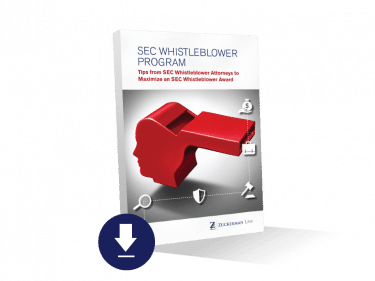SOX prohibits employers from “outing” confidential whistleblowers
Disclosing a whistleblower’s identity may constitute an adverse employment action. The U.S. Court of Appeals for the Fifth Circuit reached this conclusion in a SOX case brought by Anthony Menendez, a former director in Halliburton Inc.’s finance and accounting department.[i]
About four months after Mr. Menendez joined Halliburton, he noticed that the company’s accounting practices that involved revenue recognition did not appear to conform to generally accepted accounting principles (“GAAP”). Mr. Menendez circulated a memo in his department about the issue. In response, his supervisor, who also received the memo, said that Mr. Menendez was not a “team player” and should work more closely with his colleagues to resolve accounting issues. Halliburton nonetheless studied the issue and, a couple of months later, determined that the accounting practices were proper.
After his supervisor refused a second meeting with him about the issue, Mr. Menendez filed a confidential disclosure with the SEC about Halliburton’s accounting practices. Mr. Menendez later raised the same issues in a memo to Halliburton’s board of directors. The memo was forwarded to Halliburton’s general counsel.
When Halliburton received a notice of investigation from the SEC requiring Halliburton to retain documents, Halliburton’s general counsel inferred from Mr. Menendez’s internal disclosures that he was the source of the SEC inquiry. The general counsel then sent an email to Mr. Menendez’s colleagues instructing them to retain certain documents because “the SEC has opened an inquiry into the allegations of Mr. Menendez,” effectively “outing” Mr. Menendez as a whistleblower.
Thereafter, Mr. Menendez’s colleagues began to treat him differently, refusing to work or associate with him. He resigned within a year. Applying the Burlington Northern material-adversity standard,[ii] the Fifth Circuit concluded that “outing” Mr. Menendez was an actionable adverse action:
It is inevitable that such a disclosure would result in ostracism, and, unsurprisingly, that is exactly what happened to Menendez following the disclosure. Furthermore, when it is the boss that identifies one of his employees as the whistleblower who has brought an official investigation upon the department, as happened here, the boss could be read as sending a warning, granting his implied imprimatur on differential treatment of the employee, or otherwise expressing a sort of discontent from on high. . . . In an environment where insufficient collaboration constitutes deficient performance, the employer’s disclosure of the whistleblower’s identity and thus targeted creation of an environment in which the whistleblower is ostracized is not merely a matter of social concern, but is, in effect, a potential deprivation of opportunities for future advancement.[iii]
When Halliburton outed Mr. Menendez to his colleagues as the whistleblower responsible for the SEC investigation, the company inevitably “creat[ed] an environment of ostracism,” which “well might dissuade a reasonable employee from whistleblowing.” This ruling underscores the broad scope of actionable retaliation under SOX.
[i] See Halliburton, Inc. v. Admin. Review Bd., 771 F.3d 254 (5th Cir. 2014).
[ii] Burlington N. & Santa Fe Ry. Co. v. White, 548 U.S. 53 (2006).
[iii] Halliburton, Inc. v. Admin. Review Bd., 771 F.3d at 262.
SOX Whistleblower Protection Law
We represent corporate whistleblowers nationwide in high-stakes whistleblower retaliation cases and have obtained substantial recoveries for CEOs, CFOs, auditors, accountants, risk managers, CISOs, and other executives and senior professionals. We have recovered more than $15 million for corporate whistleblowers and have obtained settlements in excess of one million dollars in at least five SOX matters. Click here to read reviews from senior executives and professionals that we represented in whistleblower retaliation matters.
To learn more about the Sarbanes-Oxley corporate whistleblower protection law, download our free guide Sarbanes-Oxley Whistleblower Protection: Robust Protection for Corporate Whistleblowers.
SEC Whistleblower Bounties
We are also one of the leading law firms representing whistleblowers worldwide before the SEC, and indeed our attorneys represented whistleblowers at the SEC before the enactment of the Dodd-Frank Act. We helped shape the SEC rules implementing the SEC Whistleblower Program, and have represented whistleblowers in disclosing a wide range of violations of federal securities laws, including:
- Accounting fraud;
- Investment and securities fraud;
- Foreign bribery and other FCPA violations;
- EB-5 investment fraud;
- Manipulation of a security’s price or volume;
- Fraudulent securities offerings and Ponzi schemes;
- Hedge fund fraud;
- Unregistered securities offerings;
- Investment adviser fraud;
- Anti-money laundering program violations;
- False or misleading statements about a company or investment;
- Inadequate internal controls;
- Deceptive non-GAAP financial measures; and
- Violations of auditor independence rules.
See our recent article in Forbes: One Billion Reasons Why The SEC Whistleblower-Reward Program Is Effective. If you have information you would like to report to the SEC, contact an experienced SEC whistleblower attorney at Zuckerman Law for a free, confidential consultation by calling 202-262-8959.
To learn more about the SEC Whistleblower Program, download our free guide SEC Whistleblower Program: Tips from SEC Whistleblower Attorneys to Maximize an SEC Whistleblower Award.
Qualifying for an SEC Whistleblower Award: Tips for SEC Whistleblowers
5 Tips for SEC Whistleblowers and Lessons Learned from SEC Whistleblower Awards
SEC Whistleblower Program and SEC Whistleblower Awards
Client Reviews from Executives and Senior Professionals in SOX Whistleblower Retaliation Matters
- “Jason is the consummate professional when it comes to SOX retaliation claims. He is, without question, one of the most deeply knowledgeable, technical, and astute attorneys in this very specialized body of law. During one of the most difficult times in my professional career, Jason not only provided exceptional legal guidance, but equally as important, he provided emotional support that was vital to my family and me. Jason ran circles around the “major national law firm” team that was assigned to defend my employer. In fact, Jason made them look silly at times. Jason always advocated my best interests, not his own. Jason is not only an exceptional attorney who helped my family to achieve a favorable outcome, but he is a friend. I’ve worked with major law firms throughout my career and when it comes to SOX and employment law matters, there is not a finer, more talented attorney than Jason Zuckerman.”
- “Jason is everything you could possibly ask for an an attorney: highly intelligent, thoughtful, and extraordinarily knowledgeable in his specialty of the law. In a very short period of time Jason was able to assimilate a laundry list of details and offer a compelling strategy on how to effectively proceed. Moreover, he is extremely responsive.”
- “Jason did an exceptional job in quickly understanding the intricacies of my case, grasping not only his field of expertise of employment law, but also the violations of law and SEC Regulations that were central to my dispute. The overall strategy he utilized insured that opposing counsel was challenged and made clear that this case would simply not proceed based on a timetable convenient to them. Jason is thorough, accurate and seemingly working at all hours based on phone calls and correspondence. Fortunately Jason has a very down to earth personality, understands issues readily and can convey in understandable language current “legal” circumstances and probable outcomes. I would easily and thoroughly recommend Jason for issues related to a Sarbanes-Oxley or employment related dispute.”
- “I selected Jason to handle my case after consulting with three other lawyers because of his extensive SOX experience and negotiation skills. My decision paid off as he easily surpassed all of my expectations. He quickly analyzed the merits of my case and aggressively engaged my former employer to reach a favorable settlement, avoiding years of potential litigation. He was responsive, professional, ethical and a great advocate on my behalf. I truly believe that I could not have found a better lawyer to represent my interests. He would be the first person I would recommend if a colleague or friend were to ever need similar services. Put simply, Jason is a top notch lawyer who works tirelessly to achieve a positive outcome for his clients. It’s easy to see why he is regarded as an expert in the field.”
- “When I sought out a DC-based attorney to represent me, I expected a competent attorney who would get me through my sexual harassment lawsuit. What I didn’t expect was to find someone like Jason: a truly outstanding attorney who made me feel like a priority, paid close attention to detail, and brought enormous expertise to the table. I chose to hire Jason to represent me after consulting seven other lawyers — and from day one, Jason was the only one who it clear that he actually cared about me and my case. I cannot be happier that I chose Jason. He represented me with professionalism and fearlessness every step of the way. Jason always made me feel like a priority, even though he was busy with other cases/clients simultaneously. He never rushed me or pressured me, and kept me “in the loop” the entire time while we were dealing with the opposing side.”
- “Jason Zuckerman is the most focused, thoughtful and aggressive attorneys I have ever known, let alone had the pleasure to have on my side in a highly complex legal case. He brought well-honed legal insights and a rapid pace to our legal preparations. He forcefully brought those preparations to the opposing side, which gave them little choice but to engage with us until a positive settlement was reached. In addition, we found Jason to be extremely responsive at every step, even if it required working past midnight. His character is beyond reproach and his dedication through the entire process was unwavering. If I ever need someone in my legal court again, I won’t hesitate for even a second, before I seek Jason’s support.”









